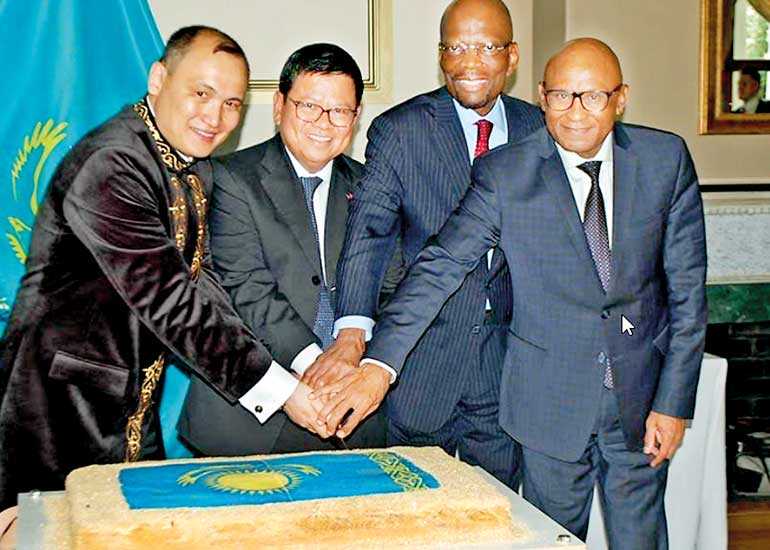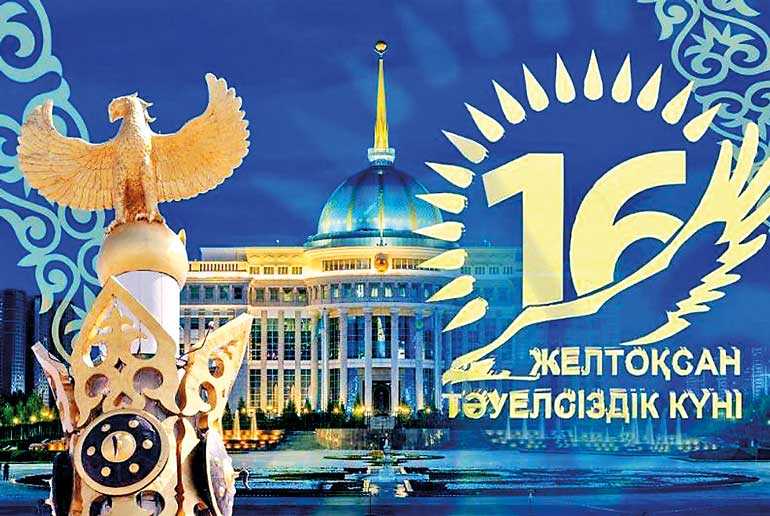Friday Feb 27, 2026
Friday Feb 27, 2026
Wednesday, 18 December 2019 01:55 - - {{hitsCtrl.values.hits}}


By Srimal Fernando and Kirtan Bhana
In Kazakhstan, like in many other nations around the globe, Independence Day is commemorated by conferring awards, national orders and medals on those that have made exemplary contributions to statehood. On 16 December 1991 the Constitutional Independence Law of the Republic of Kazakhstan was passed making Kazakhstan the last of the Soviets to leave the Union and declare sovereignty.
Many other milestones followed this historic date for the Kazakh people, including membership of the United Nations (UN), the International Monetary Fund (IMF) in 1992 and the International Atomic Energy Agency (IAEA) in 1994.
This year also marks the 10th anniversary of the closing of the world’s second largest Nuclear Test Site at Semipalatinsk by the historic decree of Nursultan Nazarbayev, First President of Kazakhstan, which paved the way for the adoption in 1996 of the Comprehensive Test Ban Treaty (CTBT). The country was declared a nuclear weapon free country.
Located strategically in the heart of Central Asia, Kazakhstan shares a 6800km border with Russia and a 1,700km border with China. Kyrgyzstan, Uzbekistan, and Turkmenistan are the other three regional neighbours. Kazakhstan is considered a landlocked country but adjoins a large part of the Caspian Sea in the west.
The Kazakh people elected a presidential system of government with two chambers of parliament. There are 14 political parties; Nur-Otan is the current ruling party. The lower house is the Mazhilis, with 107 seats and the upper house is the Senate which has 47 members. Women representation in national and local government is steadily increasing.
Having diplomatic relations with over 120 countries, Kazakhstan has a clear multi-vector international relations policy and has achieved much on the global stage in almost three decades of independence.
Being elected as a non-permanent member of the United Nations Security Council (UNSC), Kazakhstan was further crowned by being elected as president of the UNSC for 2018. Its stance on non-proliferation of nuclear weapons is well known and so is its support for the transformation of the UNSC. Kazakhstan also presented a proposal for ending terrorism in the world by 2025 during its presidency.
Kazakhstan has become a fully integrated member of the international community joining many multilateral organizations, and bilateral treaties and agreements. Turkey was the first country to present letter of credence for the Extraordinary and Plenipotentiary Ambassador to Kazakhstan.
The radical transformation of the economic to a free market has seen large foreign direct invest flows into the country, growing the economy to become the most significant in the Central Asian region.
New President Kassym Jomart Tokayev has introduced a raft of new measures that are directly aimed at stimulating enterprise, entrepreneurship and small business development. Other reforms introduced are motivation for Kazakhstan to become one of the top 30 economic nations.
Islam was introduced to Kazakhstan in the 7th century. Its ancient history is steeped in nomadic life of hunters and animal rearing. The philosophy of Al-Farabi and the poetry of Abai is legendary and filled with folklore. The dombra, a string instrument, is at the very essence of Kazakh culture and resonates with the music of love and heartache.
Modern and contemporary art forms, classical music and ballet have also found place in Kazakh society as the younger generations narrate poetry in restaurants. This together with the Kazakh’s nomadic heritage, Islamic traditions and modern art and culture has become an attraction for tourists looking for new and dynamic destinations to experience and explore.
Its breath-taking landscapes and abundant natural beauty and the snow-capped mountains offers much to the intrepid traveller as it emerges as a unified nation with much potential, opportunities and prospects.
[Srimal Fernando is a Doctoral Fellow at Jindal School of International Affairs (JSIA), India and a Global editor of Diplomatic Society for South Africa. He won the 2018/2019 Best Journalist of the year award in South Africa and Kirtan Bhana in the Founding Editor and Travel Envoy for the Diplomatic Society of South Africa.]